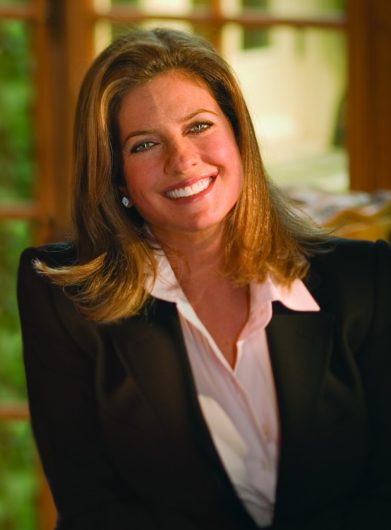
Abigail Wexner is set to speak at Spring Commencement 2017. Credit: Courtesy of Ohio State
When Abigail Wexner, a Columbus-based philanthropist and Ohio State Board of Trustees member was asked to give the Spring Commencement address on May 7 to an estimated crowd of 11,500 graduating students and their families, her first thoughts were of terror and panic. But something caught her eye and motivated the founding board member and vice chair of KIPP Columbus to accept the challenge.
“I think the person after me (on the list) wasn’t a woman and that’s important,” Wexner said. “I think it’s not comfortable, but sometimes we just have to step up and set an example, if only visually.”
Wexner is the fifth woman to speak at OSU’s Spring Commencement in the university’s history; she follows Elizabeth Dole, Bernadine Healy, Erin Moriarty and Susan Rice.
Wexner was announced as the speaker on April 7 and some students voiced disappointment, believing that she was simply the wife of Les Wexner, the namesake of OSU’s medical center. Others said they did not know who she was.
However, her passions for women’s and children’s educational safety have led to the involvement and creation of various initiatives to assist these people in living the best life possible.
“There are just some issues that really move you,” Abigail Wexner said. “It’s a question of opportunity in our country. It’s about basic inequality. These are the things we need to focus on— kids who do not have equal opportunity based on their circumstances is something that we can do something about.”
Her passion for eliminating the inequality that hinders young people from attaining a quality education led to her involvement in the creation of KIPP Columbus — a nonselective, public charter school for kids, 90 percent of which are minorities living in poverty — Abigail Wexner said.
Along with her involvement in KIPP Columbus, Abigail Wexner has been active in her role as a board of directors member with Nationwide Children’s Hospital — a position she has held since 1993. She has also served as vice chair from 2005 to 2012.
“I’ve been on the board for a long time. I was chair for seven years. I know, personally, I work better when I can really get my hands on something,” she said. “You just have to walk around the halls. It’s a really good, sobering way to remember how fortunate you are.”
Her service-driven attitude is something she says she also sees in students at OSU.
“I’d say the thing that impresses me most is this community engagement,” Abigail Wexner said. “That’s not something that we typically see in universities, and I think that’s Buckeye Nation at its best.”
While Abigail Wexner is originally from New York, she considers herself an Ohioan, and credits the Midwestern culture to her love for the Columbus area.
“I care about (OSU). I think what’s really unique about Columbus — and it’s kind of an easy thing to say — people really do care about the community,” she said. “If you care about Columbus, you have to care about Ohio State. It’s too important in terms of all the things it can influence and the young people training to do the work.”
In addition to Wexner’s commencement address, a student will be speaking for the first time in known history.
Gerard Basalla, former Undergraduate Student Government president and a fourth-year in political science and strategic communication, will be giving a speech as well.
There was no formal process in finding a student speaker, university spokesman Chris Davey said in an email. However, if OSU decides to make this a permanent part of commencement, they will consider a formalized process.
Basalla said he wants to talk about what it truly means to be a Buckeye, and intends to bring the student voice to commencement during his speech.
“I want to touch on some of the challenges that I’m sure the future of Ohio State faces and how we can overcome obstacles as a big family, and I also want to talk about some of the things that made my experience so great and be a little light-hearted,” he said.
He said that though he was chosen to speak, he is aware that his words might not ring true for all listening.
“The hope is that I get to be that voice for students, and the things that I say are things that most people believe,” Basalla said. “I can’t encompass everyone’s experience, but I can surely try.”
The speeches will be given prior to handing out diplomas to graduating students and will last for less than 20 minutes, but those speaking hope their words will remain in the minds of those in attendance for much longer.


